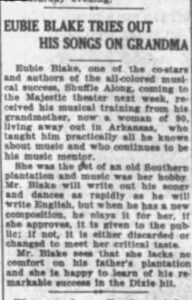YOUR DAILY DOSE OF EUBIE!!!
One of the most revealing experiences we had writing Eubie Blake: Rags, Rhythm, and Race, was in reading the contemporary reviews of Shuffle Along and the other musicals that Eubie scored. The (mostly white) reviewers in the mainstream press—whether intentionally or not—often revealed their own strong racial prejudices in their reaction to the first all-black produced, staged, and performed show on Broadway.
One of the earliest reviews in the white press appeared on May 29, 1921, in the Chicago Daily Tribune. It began on a sour note, before admitting the many virtues of the show: “Negro humor is better in print or in the synthetic face of Frank Tinney [a white comedian in the minstrel tradition] than coming from the mouths of its originators. Fifty Negroes have banded together into a musical comedy company which is playing to white audiences . . . ‘Shuffle Along’…makes brave attempts to entertain the white folks in the intervals between its gorgeous songs. … But racial genius grips the cast and you when the songs begin.. . . In two semi-quavers you are quivering to the same magic that has set all these spontaneous musicians to reeling melodiously. You may resist Beethoven or Jerome Kern, but you surrender completely to this…”
This reviewer repeats all the racist tropes about black performers: they are not “trained” singers and dancers but come to their talents “naturally” through their “racial genius.” They perform “spontaneously” not from years of training. And, the greatest insult, that white “delineators” (blackface performers) offer a truer picture of black humor than do the “real” performers themselves.
Many white critics found the show lacking in sufficient echoes of what they described as originating in the “deeper jungles,” as well-known critic Heywood Broun stated in the New York Tribune. His review didn’t appear until July, when the show itself was already the hit of the season. While he admired the show’s energetic troupe and the “frenzy and rigor” of their dancing, he found that “On the whole, “Shuffle Along” follows Broadway models. The African contribution is not large. Most [of] the music is lively and agreeable, but not much of it is new. The book could be rewritten for any pair of German dialect comedians.”
The expectation was for more stereotypical depictions of blacks, particularly in the show’s non-comedic moments. Not surprisingly, Broun singled out for praise “the choral work [and] … the singing of a male quartet” for their “primitive power,” reflecting the white belief that all best black music was spirituals sung in harmony.

Even after the show was a major hit and it was well-known that Eubie was a highly trained, sophisticated musician, the white papers couldn’t resist running such bunkum as found in the following clip. The anonymous reporter gives the totally preposterous story that Eubie got his musical skills via his 90-year-old grandmother, “the pet of the old Southern plantation.” Again, the implication is that Eubie is blessed with “natural” capabilities, but—to avoid the corrupting influences of the big city—he makes sure to play every new song for his “grandmother’s” approval. Of course, Eubie didn’t have a living grandmother; his family was long removed from plantation life, living in inner-city Baltimore. And the “old plantation” was hardly the idyllic place this writer seems to imply.